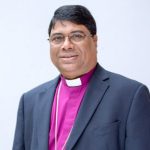Op-Ed: King Charles Takes Major Stand for Christian History as 'Defender of the Faith'
When King Charles III was announced as defender of the faith, I watched with relief.
I know that may surprise you since I am an Indian bishop, and — like most of us — I have my share of opinions on British colonialism in India.
But I also have a 2,000-year-old Christian heritage to look back on in India (going back to the missionary journeys of the Apostle Thomas), and I appreciate the candor of the British king in unashamedly acknowledging Britain’s own Christian history.
This wasn’t a foregone conclusion. Reports had alleged that Charles would consider being styled “defender of faith” due to a modern, multi-faith, diverse Great Britain.
In a nation with deep Christian roots, that nod to political correctness would have denied the fact that a country can have a majority religion and simultaneously welcome everyone.
Real pluralism doesn’t require changing history.
By being “defender of the faith,” Charles does not reduce the multi-faith nature of modern Britain. Rather, defending the faith enables and requires the king to defend the religious freedom of other faiths even while honoring his own.
For all its colonial vices, it is Protestantism that gave birth to modern democratic states and worked out a universal franchise for people of all faiths. This has been a hugely important concept and practice for human and civil rights against tyranny. These values are especially important for our times when individual rights are being trampled on in many modern states.
Charles is acknowledging the contribution of the Protestant faith to Britain and the world, notwithstanding its many historic problems. The problems are typically highlighted above the contributions, and that isn’t right.
The wanton looting of nations like India under colonialism while the British church stood by was wrong, always will be wrong, and never can be justified. Yet we can simultaneously celebrate the good of our shared history. We should not feel as if we have to defy common decency by banging the drum of colonialism at the funeral or coronation of a Christian monarch.
The relationship between the state and religion in Britain and most of the Christian West has long been complicated, but a godless state is not even possible. So one is left to find a way to deal with religions. In reality, people believe and operate with one faith or another because pursuing religion is fundamental to our human makeup.
In Britain, it is the evolved Christian faith, not politics, that allows religion to flourish even as the Christian state flourishes. Protestantism provides everyone the freedom to believe, or not to believe, and never by force or government edict.
Precisely because Protestantism defends the freedom of choice, it is valuable for the British monarch to take an oath to defend the Protestant faith. What if, for example, Britain were to become a majority-Islamic state? Would Britain’s freedoms and values still exist? Would women still be empowered? Would criticism of Islam be allowed? Would the British life of inquiry, art and justice continue?
Of course, this is never easy, and it requires the benevolence of a ruler who equally appreciates all of his citizens, whatever their creed.
In India, some leaders seem to be reworking our democracy as a Hindu majority state. But instead of embracing the historic pluralism that has defined our rich history and made democracy a natural byproduct of our post-colonial independence, there is an effort to marginalize the minority population in politics and other areas, including the demonization of the Christian community.
A plethora of so-called anti-conversion laws have been passed to prevent free people from choosing to believe or not to believe. Some are even proposing a new constitution granting the right to vote only to Hindus.
This is not the right approach, and it is also not required for our country to both maintain its Hindu identity while also providing equal rights to everyone. That’s a lesson we Indians can still learn.
Fundamentalist religious ideologies — whether they be Christian, Hindu or Muslim — can only be countered by ideologies that are built on the values of human rights, freedom and equality under the law.
King Charles risks far less for religious freedom by being proudly Protestant than by trading his higher theological values for winner-takes-all political correctness.
I’m proud to be a Christian myself, proud of the king’s decision in Great Britain, and especially proud to be an Indian Christian because we know intuitively how to be who are, but never at the expense of our non-Christian neighbors.
The views expressed in this opinion article are those of their author and are not necessarily either shared or endorsed by the owners of this website. If you are interested in contributing an Op-Ed to The Western Journal, you can learn about our submission guidelines and process here.
Truth and Accuracy
We are committed to truth and accuracy in all of our journalism. Read our editorial standards.
Advertise with The Western Journal and reach millions of highly engaged readers, while supporting our work. Advertise Today.












